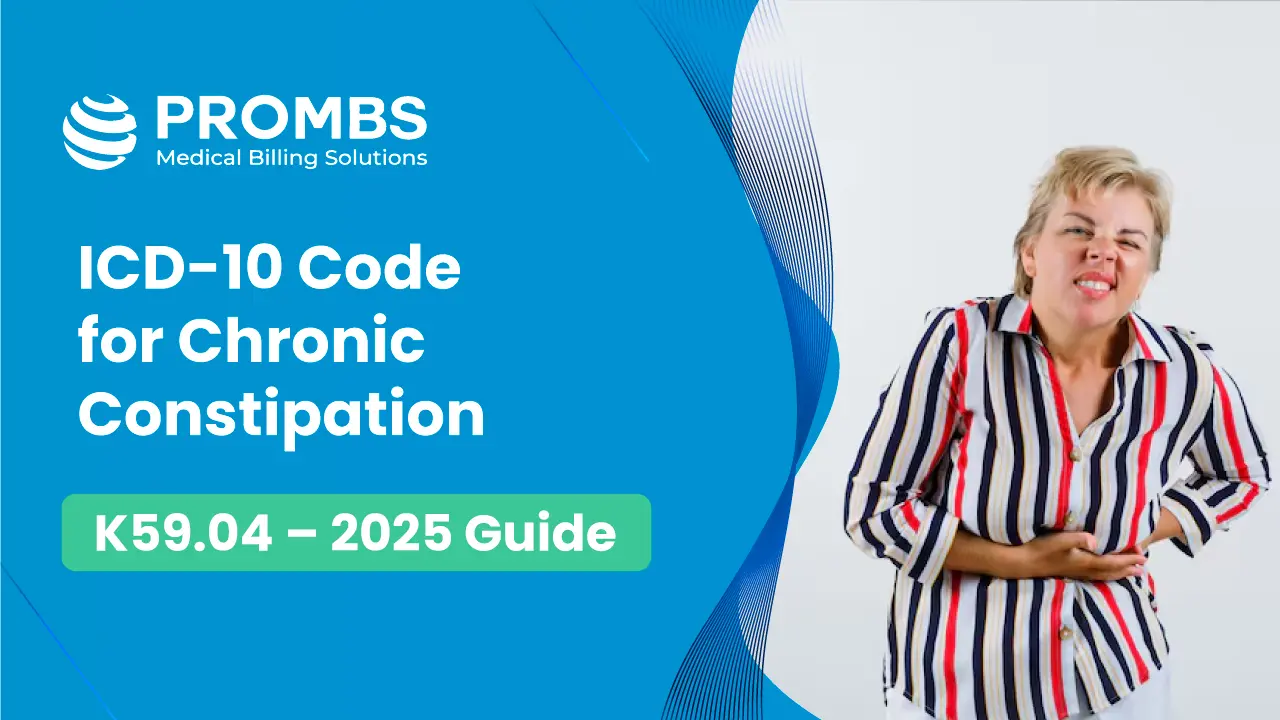Accurate ICD-10-CM diagnosis coding is critical for clean claims, audit protection, and proper reimbursement. Even a common gastrointestinal complaint like constipation can lead to denials when documentation fails to support chronicity or etiology.
Selecting the correct Constipation ICD 10 code requires clear clinical evidence and precise provider language. Using the most specific ICD 10 code for constipation helps reduce denials, improve reimbursement accuracy, and strengthen audit defensibility.
Throughout this guide, we break down how to correctly assign the most specific constipation ICD 10 code to ensure compliance and maximize reimbursement.
What is Chronic Constipation?
Chronic constipation is defined as infrequent bowel movements, difficult stool passage, or both, persisting for three months or longer. For ICD-10-CM coding, chronicity should be based on documented symptom duration of ≥3 months, consistent with clinical and coding standards, rather than “several weeks.”
It is typically characterized by:
- Hard, Dry Stools
- Straining Or Incomplete Evacuation
- Fewer Than Three Bowel Movements Per Week
- Persistent Symptoms Lasting At Least Three Months
From a coding perspective, chronic constipation may be functional (idiopathic) or secondary to medications, metabolic disorders, neurologic disease, or structural abnormalities.
Because each subtype maps to a different ICD 10 code for constipation, documentation must clearly state the type, duration, and cause. Without specificity, coders default to unspecified codes that increase denial risk and weaken reimbursement accuracy.
What Is the Correct Constipation ICD 10 Code?
The correct constipation ICD 10 code depends on the documented type and cause. If the provider confirms chronic functional constipation with no secondary etiology, assign:
- K59.04 - Chronic idiopathic constipation
If the constipation is medication-related, use:
- K59.03 - Drug-induced (opioid induced constipation, ICD 10)
If no type or duration is documented:
- K59.00 - Constipation, unspecified
Always code to the highest documented specificity, not assumptions. Unspecified codes increase denial risk and reduce reimbursement accuracy.
Chronic Idiopathic Constipation ICD 10 Explained
The chronic idiopathic constipation ICD 10 code specifically refers to K59.04.
This code should only be used when:
- Not Drug-Induced
- Symptoms Persist ≥ 3 Months
- Functional Origin Documented
- No Structural or Metabolic Cause Identified
If the cause is known, do not use K59.04. Assign the secondary-specific code instead. Using this code incorrectly may create compliance exposure during audits.
When to Use and When Not to Use K59.04
When Should You Use K59.04?
- No secondary cause is identified after evaluation.
- Symptoms have persisted for at least three months and meet the chronic definition.
- Documentation explicitly states “chronic idiopathic constipation” or “functional constipation.”
- The provider’s note links the constipation to a primary functional cause rather than a transient condition.
When Should You Avoid K59.04?
- The constipation is acute or short-term (use K59.00 or other appropriate acute code).
- The constipation is clearly secondary to another condition (e.g., drug-induced, outlet dysfunction, slow transit).
- There is an underlying diagnosis (e.g., fecal impaction, bowel obstruction) that takes precedence for coding.
- Documentation uses nonspecific language like “patient complains of constipation” without specifying type or duration.
Sequencing Note:
When constipation is secondary to another condition (e.g., hypothyroidism, Parkinson’s disease, opioid use), code the underlying cause first, followed by the appropriate constipation code (e.g., K59.03 for drug-induced constipation). This sequencing follows ICD-10-CM guidelines to ensure accurate reporting of the primary condition driving the patient’s care.
What Other Constipation ICD 10 Codes Exist?
| Condition | ICD-10 Code | When to Use | Clinical Requirement |
|---|---|---|---|
| Chronic idiopathic constipation | K59.04 | Chronic constipation ICD 10 | Functional condition lasting ≥ 3 months with no identifiable cause |
| Opioid induced constipation | K59.03 | Opioid induced constipation ICD 10 | Directly linked to opioid or medication use |
| Slow transit constipation | K59.01 | ICD 10 for constipation subtype | Documented colonic motility delay or prolonged stool transit time |
| Outlet dysfunction constipation | K59.02 | ICD 10 constipation pelvic floor | Pelvic floor dyssynergia or evacuation disorder confirmed |
| Constipation unspecified | K59.00 | ICD 10 code for constipation | Insufficient documentation to determine type or chronicity |
Why This Helps Coders
- Inclusion terms come directly from the Official ICD-10-CM Tabular List, so they are authoritative.
- It speeds up code selection because coders can match provider language directly to code options.
- It helps reduce unspecified code overuse, because coders can identify a more specific match without extra queries.
What Documentation Do Payers Require?
Accurate coding depends entirely on provider documentation. To code chronic constipation correctly, the record should include the following elements:
- Type of constipation: Specify whether the case is idiopathic, slow transit, outlet dysfunction, drug-induced, or unspecified.
- Chronicity: Document the duration of symptoms and confirm that it meets the clinical definition of chronic constipation.
- Etiology: For idiopathic cases, confirm that no secondary causes have been identified through patient history and examination.
- Diagnostic evidence: Include results from relevant testing such as colon transit studies, anorectal manometry, or Sitzmarker testing, if performed.
- Linkage to underlying causes: When drug-induced constipation is suspected, link the diagnosis to the patient’s medication list to establish causality.
- Severity and impact: Describe the degree of symptom severity and its effect on daily activities to justify medical necessity for treatments or procedures.
Clinical Validation Reminder:
Always ensure that the provider’s documentation of constipation, including type, chronicity, and etiology, is supported by the patient’s clinical presentation and objective findings (e.g., physical exam notes, diagnostic test results, symptom duration). Coding a diagnosis without sufficient clinical correlation can lead to audit findings, claim denials, or compliance risks.
How Can You Code Constipation Accurately?
1 - Educate Providers on Specificity Needs
Encourage precise terminology in notes: “Chronic idiopathic constipation” rather than simply “constipation.”
2 - Query When Documentation is Incomplete
If chronicity or type is not specified, submit a coding query before defaulting to unspecified codes.
3 - Differentiate from Complications
Separate codes should be assigned if complications like fecal impaction or incomplete defecation are documented.
4 - Follow Excludes1 and Excludes2 Rules
Be aware of codes that cannot be reported together for the same encounter unless separately justified.
5 - Audit for Overuse of Unspecified Codes
Audit constipation coding regularly to detect and correct overuse of unspecified codes.
Why Do Constipation Claims Get Denied?
In real-world billing operations, constipation denials rarely happen because the wrong code was chosen. They happen because documentation lacks proof of chronicity or causation.
From experience auditing thousands of GI claims, the most common problems include:
- Provider Writes Only “Constipation.”
- Duration Not Documented
- Drug-Induced, Not Linked To Medication
- Chronicity Assumed But Not Stated
- High-Cost Testing Without A Medical Necessity Explanation
Payers treat constipation as a low-acuity symptom unless documentation clearly supports chronic disease or functional disorder.
Without specificity, claims are downcoded or rejected. Coding accuracy begins with documentation clarity, not code lookup.
How Do You Sequence Constipation ICD 10 Codes?
Correct sequencing is critical for reimbursement and audit defense. When constipation is secondary, the underlying cause must be listed first.
Examples:
- Hypothyroidism With Constipation →E3.9 First, Then K59.00
- Parkinson’s Disease With Constipation → G20 First, Then K59.00
- Opioid Therapy Causing Constipation → T40- Adverse Effect First, Then K59.03
- Fecal Impaction Requiring Treatment →K56.41 May Take Priority
Golden rule:
Code the condition driving the encounter first. Constipation becomes secondary. Incorrect sequencing is a frequent trigger for payer audits.
Need Help Improving Constipation Coding Results?
Our Pro-MBS team understands that coding gastrointestinal conditions such as chronic constipation requires more than a basic ICD-10-CM lookup.
We combine advanced coding expertise with Clinical Documentation Improvement (CDI) strategies to ensure claims are complete, compliant, and fully defensible during audits.
This process includes targeted provider education on documenting type, duration, and etiology, along with meticulous pre-submission audits designed to capture missed specificity and correct coding variances before claim submission.
Through real-time coder–provider collaboration and structured denial-prevention workflows for high-scrutiny gastrointestinal diagnoses, our team ensures accurate code assignment that aligns with payer guidelines and industry standards.
These measures not only safeguard reimbursement but also strengthen compliance posture, reduce denial rates, and support the long-term financial stability of healthcare organizations.
All guidance in this article follows the ICD-10-CM Official Guidelines for Coding and Reporting (FY 2026), CMS documentation standards, and real-world revenue cycle best practices used by certified medical coders.
Frequently Asked Questions
What is the ICD 10 code for chronic constipation?
K59.04 is the ICD 10 code for chronic idiopathic constipation when the condition is functional and persists longer than three months.
What code is used for opioid induced constipation ICD 10?
Use K59.03 and sequence the medication adverse-effect code first.
Can I use unspecified constipation codes?
Yes, but only if documentation lacks type or duration. Overuse increases denials and reduces clinical accuracy.
Is constipation considered a primary diagnosis?
Usually no. It is often secondary to another disease or medication. Sequence the underlying cause first.
How do payers validate chronic constipation?
They look for duration, failed conservative therapy, testing, and documented impact on daily function.



